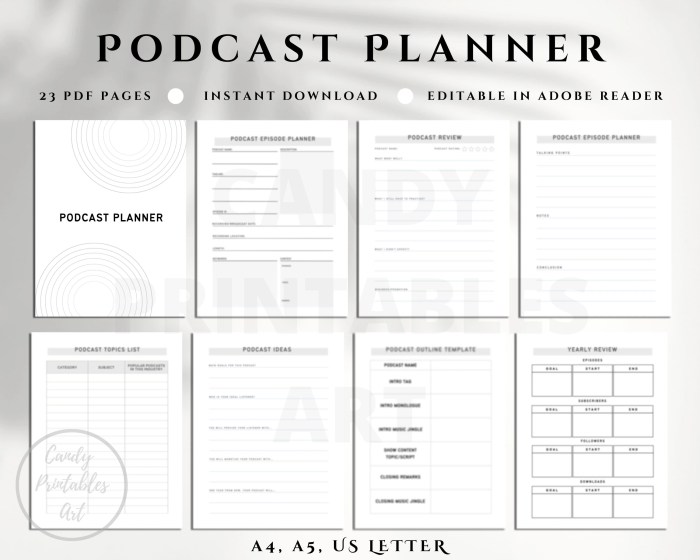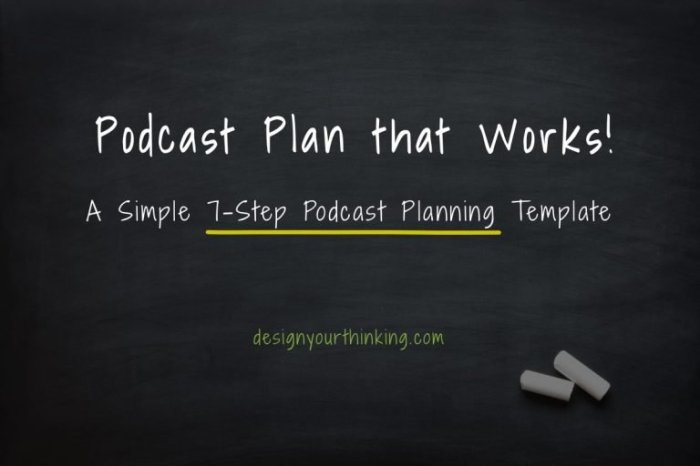Developing a Podcast Content Plan sets the stage for creating dynamic and captivating episodes that resonate with your audience, ensuring a successful podcast journey ahead. From understanding your listeners to structuring content effectively, this guide will equip you with the essential skills to make your podcast stand out.
Understanding Your Audience

Knowing your target audience for a podcast is crucial for creating content that resonates with them. By understanding who your listeners are, you can tailor your episodes to meet their preferences and interests.
Importance of Demographics and Psychographics
Demographics such as age, gender, location, and income level can provide valuable insights into the characteristics of your audience. Psychographics, on the other hand, delve into the attitudes, values, and lifestyle choices of your listeners. By analyzing both demographics and psychographics, you can create content that speaks directly to your target audience.
- Demographics help you understand the basic traits of your audience, while psychographics offer deeper insights into their motivations and behaviors.
- For example, if your podcast caters to young professionals in urban areas, you might focus on topics related to career growth, city living, and work-life balance.
Listener Feedback and Content Planning
Listener feedback is a valuable tool for shaping your content strategy. By listening to what your audience has to say, you can identify areas for improvement, new topics to explore, and content formats that resonate with your listeners.
- Encourage your audience to provide feedback through surveys, social media polls, and direct messages.
- Use listener feedback to refine your content plan, address listener needs, and keep them engaged with your podcast.
Role of Market Research
Market research plays a key role in understanding audience preferences and trends. By conducting market research, you can gather data on industry benchmarks, competitor strategies, and emerging topics that are relevant to your audience.
- Utilize tools like online surveys, focus groups, and industry reports to gather insights into your target audience.
- Stay informed about market trends and changes in audience preferences to adapt your content strategy accordingly.
Defining Podcast Goals and Themes: Developing A Podcast Content Plan
Setting clear objectives for a podcast is crucial in guiding its direction and ensuring it resonates with the target audience. By defining specific goals, podcast creators can tailor their content to meet the needs and interests of listeners. Examples of different podcast themes and genres include true crime, comedy, self-improvement, storytelling, interview-based, and educational podcasts. Each theme appeals to a distinct audience and serves a unique purpose.
Aligning Content with Goals for Engagement
Aligning podcast content with goals can enhance engagement by creating a cohesive listening experience. For instance, if the goal of a podcast is to entertain and engage listeners through storytelling, the content should focus on compelling narratives and engaging storytelling techniques. By consistently delivering content that aligns with the podcast’s goals, creators can build a loyal audience base and increase listener retention.
- Consistency in theme is essential for listener retention as it helps establish brand identity and build audience trust.
- Podcast themes should reflect the overarching goals of the podcast to ensure that content remains relevant and engaging.
- By maintaining a clear theme throughout episodes, creators can attract and retain listeners who are interested in the specific topic or genre.
- Consistency in theme also helps creators stay focused and maintain a coherent narrative structure, which contributes to overall listener satisfaction.
Content Structuring

When planning episode formats for your podcast, it’s crucial to have a clear structure in mind. This helps keep your content organized and engaging for your audience. Here are the steps involved in structuring your podcast episodes:
Planning Episode Formats
- Start with a strong introduction that hooks your listeners and sets the tone for the episode.
- Artikel the main topics or segments you want to cover, ensuring a logical flow between each.
- Decide on the length of your episode and allocate time for each segment accordingly.
- Consider incorporating interviews, guest appearances, or listener submissions to add variety to your content.
Scripted vs. Unscripted Content
- While scripted content can ensure a polished and structured delivery, unscripted segments can bring authenticity and spontaneity to your podcast.
- Find a balance between scripted and unscripted content to maintain a natural flow while staying on track with your episode’s objectives.
- Use scripts as a guide rather than a strict rule to allow for improvisation and genuine interactions.
Maintaining Cohesive Structure
- Use recurring segments or themes to create a sense of continuity across episodes.
- Establish a consistent format for intros, outros, and transitions to help listeners navigate your content easily.
- Refer back to previous episodes or tease upcoming topics to build anticipation and keep your audience engaged.
Creating Engaging Hooks and Intros
- Start with a captivating hook that grabs your listeners’ attention from the beginning.
- Introduce your podcast and episode topic in a concise and compelling way to pique curiosity.
- Incorporate music, sound effects, or personal anecdotes to add personality and create a memorable opening for each episode.
Guest Management and Interview Preparation
When it comes to hosting a successful podcast, inviting guests can bring a whole new level of expertise, perspectives, and engagement to your show. Guests can help attract new listeners, provide valuable insights, and even open up networking opportunities within your industry.
Benefits of Inviting Guests
- Brings fresh perspectives and expertise to the conversation.
- Attracts a new audience who may be interested in your guest’s work.
- Increases credibility and authority by associating with industry experts.
- Provides networking opportunities for future collaborations or partnerships.
Reaching Out and Managing Guest Appearances, Developing a Podcast Content Plan
- Research potential guests who align with your podcast theme and goals.
- Reach out via email or social media with a clear pitch and benefits of appearing on your show.
- Coordinate schedules and provide clear instructions on the interview format and logistics.
- Follow up with reminders and any necessary preparations leading up to the interview.
Preparing Questions and Conducting Engaging Interviews
- Research your guest’s background, work, and expertise to tailor questions accordingly.
- Prepare a mix of open-ended and specific questions to spark meaningful conversations.
- Listen actively during the interview and allow for natural flow and follow-up questions.
- Create a comfortable and welcoming environment for your guest to share insights and stories.
Role of Research in Understanding Guest Expertise
- Gain a deeper understanding of your guest’s work, achievements, and contributions to the industry.
- Identify key talking points or areas of interest to focus the interview on.
- Show respect for your guest’s expertise by acknowledging their accomplishments during the conversation.
- Use research to ask informed and insightful questions that resonate with both your guest and audience.